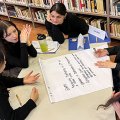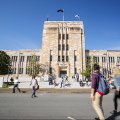Initial investigations by a team of UQ law student researchers into whether the new Pacific Seasonal Worker Pilot Scheme (PSWPS) represents “slavery or salvation” for unskilled migrant workers will be presented at a public lecture next week.
Offered as part of UQ’s Research Week, the free public lecture “Slavery or Salvation? Unskilled Labour Migration into Queensland” will be held at 5pm on Monday September 20 at the St Lucia campus.
Preliminary research by UQ’s Human Trafficking Working Group has examined the background and operation of the recently introduced PSWPS, amid accusations it may create instances of forced labour and open the floodgates to unskilled migrants from around the world.
Human Trafficking Working Group Coordinator and TC Beirne School of Law Associate Professor Andreas Schloenhardt said the introduction of the PSWPS by the Australian Government marked an important policy shift.
“This is the first time an immigration category has been created for unskilled foreign workers and the PSWPS allows workers from selected Pacific Islands to work in the Australian horticulture industry," Dr Schloenhardt said.
“While some critics liken the PSWPS to a modern form of slavery, others argue the Scheme has the potential to eliminate the need to employ illegal workers and will prevent labour trafficking and migrant smuggling."
The public lecture will explore the past, present and future implications of unskilled labour migration to Queensland.
Two School of Law student researchers involved in the project will also be making presentations at the public lecture.
Bachelor of Laws student Matthew Cameron will be talking about the stormy history surrounding the immigration of unskilled workers into Queensland.
“Following the importation of workers from the Pacific islands in the late 1800s, often known as ‘blackbirding’, successive Australian Governments have repeatedly rejected calls to allow any form of unskilled labour immigration," he said.
"The continuing controversy over this issue has resulted in significant labour shortages.”
Bachelor of Laws student Christopher Deitch will be looking at the implications of the ongoing unmet labour demand.
“Labour shortages are particularly evident in the horticulture industry in Queensland and Victoria. Jobs in these areas are often filled by working holiday makers or by illegal foreign workers, who often work in poor conditions and do not receive adequate pay and other benefits,” he said.
Further information about the public lecture is available at www.law.uq.edu.au/humantrafficking
Attendance is free and no RSVP is required.
Media:
Associate Professor Andreas Schloenhardt, 07 3365 6191, a.schloenhardt@law.uq.edu.au
Lynda Flower, School of Law Marketing, 07 3362 2523, l.flower@law.uq.edu.au
.jpg)











